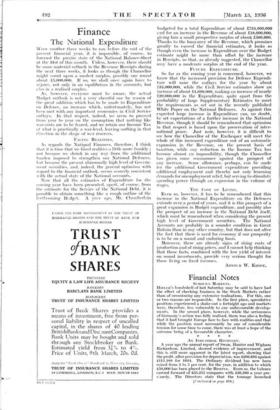The National Expenditure
Finance
Wail another three weeks to run before the 'eini or the present financial year, it is impossible, of course, to forecast the precise state of the National Balance-Sheet at the 31st of this month. Unless, however, there should be some material setback in the Revenue Receipts during the next three weeks, it looks as though the Chancellor might count upon a modest surplus, possibly one round about £5,000,000. If so, we shall once again have to rejoice, not only in an equilibrium in the accounts, but also in a realised surplus.
As, however, everyone must be aware, the actual Budget outlook is not a very cheerful one by reason of the great addition which has to be made to Expenditure Oil Defence, an increase which, unfortunately, has not been met with any important economies in Civil Service outlays. In that respect, indeed, we seem to proceed from year to year on the assumption that nothing like war-costs are to be feared, and we retain our Income Tax at what is practically a war-level, leaving nothing in that direction in' the shape of war reserves.
FAeixo, REALITIES.
As regards the National Finances, therefore, I think that it is time that we fiteed realities a little More frankly ; not because we shrink in any way from the additional burden imposed to strengthen our National Defences, but because the present abnormally high level of Govern- ment securities, and, indeed, the general optimism with regard to the financial outlook, seems scarcely consistent with the actual state of the National accounts.
Now that all the estimates of Expenditure for the coming year have- been presented, apart,. of course, from the estimate for the Service of the National Debt, it is possible to obtain something like a rough outline of the forthcoming Budget. A yens ago. Mr. amberlain budgeted for a total Expenditure of about £734,000,000 and for an increase in the Revenue of about £18,000,000, giving him a small prospective surplus of about £500,000. Thanks to the buoyancy of the Revenue, which promises greatly to exceed the financial estimates, it looks as though even the increase in Expenditure over the Budget estimate might be more than offset by the increase in ReceiPts, so that; as already Suggested, the Chancellor may have a moderate surplus at the end of the year.
FUTURE EXPENDITURE.
So far as the corning year is concerned, however, we know that the increased provision for Defence Expendi- ture will raise the outlays for the year by about £34,000,000, while the Civil Service estimates show an increase of about £4,600,000, making an increase of nearly £39,000,000 in the Expenditure, quite apart from the probability of large Supplementary Estimates to meet the requirements as set out in the recently published White Paper on the National Defences. As against this expected large increase in Expenditure can, no doubt, he set expectations of a further increase in the National Revenue, though it should be remembered that optimism in that respect is based upon the preservation of inter- national peace. Just now, however, it is difficult to see how the Chancellor of the Exchequer will meet the whole of this increased expenditure out of an automatic expansion in the Revenue, on the present basis of taxation, while any reduction in the Income Tax has become almost an impossibility, though the Chancellor has given some reassurance against the prospect of any increase. Some allowance, perhaps, can be -made for the additional Government expenditure providing additional employment and thereby not only lessening demands for unemployment relief, but serving to stimulate spending power through an expansion in the volume of wages. '
THE COST OF LIVING.
Even so, however, it has to be remembered that this increase in the National Expenditure on the Defences extends over a period of years, and it is this prospect of a great expansion in Budget expenditure, and possibly also the prospect of an increase in the National Debt itself, which must be remembered when considering the present high level of Government securities. The National Accounts are probablv in a sounder condition in Great Britain than in any other country, but that does not alter the fact that there is need for economy if our prosperity is to be on a sound and enduring basis.
Moreover, there are already signs of rising costs of production and of rising prices, and I cannot help thinking that those facts, combined with the low yield of interest on sound investments, provide very serious thought for those living on fixed incomes.
ARTHUR W. KIDDY.














































 Previous page
Previous page